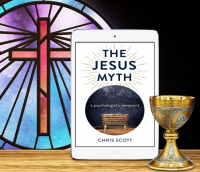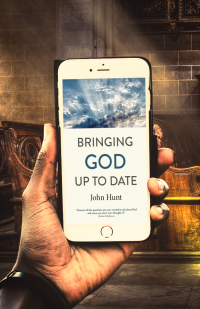
From the Introduction of Mark Vernon's new title, A Secret History of Christianity
Something is going wrong with Christianity. In the western world, it’s not hard to make the case that something’s gone terminally wrong. People are abandoning churches in their droves or, more commonly, simply steering clear of the services that nourished their forebears. In spite of sustained attempts to reverse the decline, and notable exceptions to the rule, nothing seems able to stop it.
This book is a response to the crisis, though it differs from others. It focuses on the inward aspect of Christianity’s troubles. It approaches the problem at a felt or mystical level.

The root issue, I believe, lies with how Christianity has come
to be presented or, to be more precise, how religious Christians
have come to misunderstand the message. What was once
experienced as a pathway to more life has, today, morphed into
a way of life that to outsiders seems self-evidently deluded,
defensive or distorted. The almost limitless capacities of the
human soul, which in the past have been articulated and explored
by Christianity’s key exponents, as they have by the adepts
of other traditions, have been largely forgotten by Christians
today, and sometimes actively rejected. The upshot is that the
working assumption of many western people is that Christianity
will curtail your options, not expand your life, let alone affirm
the truth about yourself. The people whom sociologists call
“spiritual but not religious” and “nones” shrink from it.
It’s tragic and, in my view, most Christian apologetics
haven’t really understood the nature of the problem. It’s why
more evangelical writers try to sell or prove, not learn and
grow. It’s why more liberal writers tend to cut Christianity back,
feeling they must conform to, not test, contemporary secular
assumptions. Both wings whittle away the secret sense of life to
which the historical Jesus was clearly supremely alert.
By “secret,” I don’t mean a Dan Brownish reference to an
occult code, let alone a conspiracy theory, but to a truth that
seems obscure or hidden only because it’s tricky to grasp. It’s
secret in the sense of being hard to see even when plainly spelt
out. It’s secret in the way that a buried hoard is secret though is,
in truth, simply resting beneath your feet, waiting to be found.
It’s a perception that can be known like the quiet constancy of
your breath. It’s that your life springs from God’s life and that
this truth is yours to be discovered. It can be known directly, not
on the basis of someone else’s report, someone else’s authority,
someone else’s rhetoric, but inwardly and reliably – though it’s
the work of a lifetime fully to align with it.
This is, in fact, standard mystical theology. It follows from
the discernment that God is not another being, like you and me,
but is the ground of being itself. God is known implicitly as the
poetry in the poem, the fire in the equations, the life in the living,
the pulse of the cosmos. And it’s a truth that must be inhabited
to be understood.
The situation has become critical for Christianity because
over the last four or five hundred years churches have been
losing touch with this inner element, which is crucial for any
path that would call itself spiritual. That’s happened for various
reasons – the rise of science, the impact of the Reformation, the
separation of psychology from spirituality. Nonetheless, it is
possible to rediscover. Like the goodly pearl of great value, it’s
waiting to be uncovered.
 Mark Vernon is a writer, commentator and psychotherapist, contributing to and presenting programmes on BBC radio, as well as writing for the national and religious press, and online publications like Aeon. He also podcasts, gives talks and leads workshops. He has a PhD in ancient Greek philosophy, and other degrees in physics and in theology, having studied at Durham, Oxford and Warwick universities. He is the author of several previous books, including The Meaning of Friendship (Palgrave Macmillan), God: The Big Questions (Quercus), and The Idler Guide to Ancient Philosophy (Idler Books). He used to be an Anglican priest and lives in London, UK.
Mark Vernon is a writer, commentator and psychotherapist, contributing to and presenting programmes on BBC radio, as well as writing for the national and religious press, and online publications like Aeon. He also podcasts, gives talks and leads workshops. He has a PhD in ancient Greek philosophy, and other degrees in physics and in theology, having studied at Durham, Oxford and Warwick universities. He is the author of several previous books, including The Meaning of Friendship (Palgrave Macmillan), God: The Big Questions (Quercus), and The Idler Guide to Ancient Philosophy (Idler Books). He used to be an Anglican priest and lives in London, UK.
For more information see www.markvernon.com
Mark has his own series of short podcasts discussing various Christian musings.
Categories:
0 comments on this article







